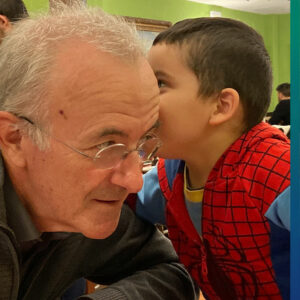
The older I get the more aware I am of the peculiarities in my everyday communication. After all these years I think I understand everything and do not need to explain too much.
For most of the time that is true. But on some occasions, my ears are tuned to what I want to hear and my partner asks where I am with my head.
These are the moments that I become aware that nothing is more complicated as good communication. In this article, I will try to explain what makes good communication so difficult.
To make it as clear as possible, the article is not aimed at improving your personal communication. No rules of thumb will be presented. But the following analysis of the difficulties of communicating will give you a better understanding of your own everyday communication.
Some of the links might be affiliate links. As an affiliate associate, we earn a small commission when you purchase any of the products offered through the shared links at no extra cost for you. This helps us to maintain this website.
Table of contents
How difficult can communication be?
Some examples. A Dutch cartoonist designed a sticker for the European Elections. He combined a bald man in a straight jacket with the European stars over his head. With this, he wanted to symbolize the possibility to free oneself by casting a vote for the European Parliament. This message appeared to be far too abstract and complicated. Most people thought the man was hit on the head. Hardly anyone made a connection with the elections.

To encourage miners to clean up the tunnels of the mine, posters were made and put on the walls in the tunnels. Because the miners were analphabetic the posters consisted of three drawn pictures.
From left to right the picture first showed a miner arriving with the empty car, in the second picture the miner picked up the rock from the floor, and in the third picture the miner drove off with the car. Unfortunately, the miners read the pictures from right to left and started to empty their coal filled cars in the tunnels.
The next example will give you an indication of the risk of falling for a vendor in a shop or at your door. Salesmen who use an average of 200 words a minute are more successful than colleagues that only make it to a mere 100 words.
Another example. If women use utterances such as ‘yes’ and ‘uhhuh’, this does not signify that they agree. They just encourage their conversation partner(s) to talk and signify they understood what was said. Men do the opposite. They purposely refrain from the use of supportive or encouraging expressions to discourage their conversation partners.
More difficulties

Sometimes we’re not aware of the advantages of being able to speak, and hear, and read and write. Our youngest grandchild used to be a bit shy when he saw us again after some time. He was 4 back then, so it was okay. And at the end of the day, he was his old self again. Naughty and talkative.
But at some point, visiting us, it was a bit different. When he disliked something he crossed two fingers and looked you in the eye. Without uttering a word.
When asked where the dogs were, he made a roof with his two hands. Indicating: at home. His father explained that they had a deaf child in their class who could only communicate with sign language.
Apparently, the other kids picked this up quickly. This was great because they were able to understand each other. After a couple of days, I copied some of his sign language as well. When I disliked what he did I made a cross with two fingers just as he did. He answered me by silently moving his index finger from left to right. He did not like me copying him.
Communication overload

So there are many possibilities to bridge our communication gaps. However, there is also a downside to all this communicating. Some scientists warn us of the overload of information since we have to process so much every day.
This overload is supposed to make us immune to serious information or, even worse, alienate us from society. Warnings of this kind started already before the Era of the Internet got well on its way. So how overloaded must we be at present?
The Spanish sociologist Manuel Castells explained how invasive the Internet would become in our everyday lives and how much it would change our world. It would become a totally new and overpowering part of our economy and of our social lives.
He was proven right. At the moment, the richest companies in the world are those that earn their money with the Internet. Politics is driven by the Internet. Even war nowadays seems to go viral.
Well connected

And how are our social lives affected by the Internet? One day we had lunch at a small restaurant on a boulevard. The sun was shining and the temperature was good. At the bar in the restaurant sat some old men. I guessed they were pensioners. They vividly talked to each other.
However, at the same time, their eyes were focused on their mobile phones. Now how can you talk with each other and at the same time watch your mobile phone? Of course, they exchanged what they saw on their mobile phone screens. Who said men can’t multitask?
From a German survey, I learned that the digitization among people over 70 tripled in 4 years (2014-2018), from 20% to 60%. They seem to use their mobile phones to access the Internet. We also often see older people walking on the street and talking loud to the mobile phone they keep in front of them. Substantiating their arguments with arms and legs.
The Internet and mobile phones ‘modernized’ the lives of the younger generations. As it seems, the older generations are picking up speed and are very well connected as well.
Why is good communication difficult?

To a certain extent, we all have some implicit and explicit notions of what communication is. If not, we would not be able to communicate at all. The next example will clarify this and at the same time show how difficult communication is.
If someone says, ‘my life is a rollercoaster’ or ‘my life is boring’, we all have some notion of what this means.
But is our curiosity satisfied? Do we now understand what kind of life merits qualifications such as ‘rollercoaster’ or ‘boring’? Of course not. Hence, a social communication process starts. We ask questions and get answers.
Yet, if communication would be this simple the world would be a better place.
So why is good communication that difficult? As it appears, people have different assumptions of what communication is. These assumptions limit a better understanding of what someone says or writes. Moreover, these assumptions jeopardize our social interactions. But what are these assumptions?
Related: Effective Communication between Couples, Young or Ageing
Metaphors of Communication

In general, some eight different assumptions or ‘mind frames’ of communication have been detected. These assumptions or ‘mind frames’ are called ‘Metaphors of Communication’. It is very exciting if you can recognize these in your own everyday communication:
- Conduit. Communication is presented as a ‘canal’ through which a message passes. This ‘canal’ is equipped with an input, throughput and output system.
- Information processing. This metaphor is all about the transmission of targets, content and patterns of information flow (seeking and receiving information).
- Linkage. This metaphor ‘ties’ people together, in networks of relations. Ties that define the social roles and identities we assume, and that ‘link’ our social actions across time and space.
- Performance. Communication is seen as a mechanism that feeds social interaction and focuses on interaction and meaning.
- Discourse. This metaphor refers to the language that is used in a conversation or a text as the essence of communication.
- Symbol. This metaphor privileges meaning rather than language as the core of communication. The symbols used, produce meaning through cultural, historical and political interpretations.
- Voice. This metaphor focuses on the power that communication exerts over people. It’s about engagement as well as marginalization. It’s about the construction as well as the disguise of meanings.
- Contradiction. This metaphor underlines that tensions and contradictions make up much of the communication in human social systems.
Two clever communicating boys

If you want to find out what metaphors suit you best, analyze the following anecdote. Let us know, in the ‘comment box’, which of the eight metaphor(s) above came to your mind.
One year, during the holidays, the grandchildren were here. At some moment, together with them, we watched a Dutch music program. After some 10 minutes, the eldest said in Spanish: “They speak the same language as you do.” This was a funny and at the same time very smart remark.
His little brother a day earlier already concluded that I could not understand him because I do not speak Spanish and he does. Although I perfectly understood what he said! They are both clever boys. And we all noticed how our Spanish skills had improved. Our Spanish lessons and conversations pay off. There is nothing more important than being able to communicate with your grandchildren.


